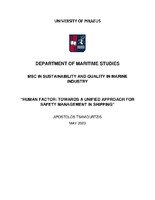Human factor : towards a unified approach for safety management in shipping

Master Thesis
Συγγραφέας
Tsamourtzis, Apostolos
Τσαμουρτζής, Απόστολος
Ημερομηνία
2023-05Επιβλέπων
Tzannatos, ErnestosΤζαννάτος, Ερνέστος
Προβολή/
Λέξεις κλειδιά
Human factor ; Soft skills ; TMSA new element 14 ; Safety culture ; Just cultureΠερίληψη
Εισαγωγή:
Η ναυτιλία είναι ένα ειδικό εμπορικό και οικονομικό σύστημα λόγω της φύσης και της ιδιαιτερότητας των εμπλεκόμενων φορέων, της εξειδικευμένης τεχνογνωσίας που απαιτείται και του πολύ υψηλού κεφαλαίου. Οι ναυτιλιακές εταιρείες έχουν πολύπλοκες οργανωτικές και διαχειριστικές δομές, λειτουργώντας ως παγκόσμιοι οργανισμοί. Για τη σωστή λειτουργία των επιχειρήσεων πρέπει να γίνεται σωστή διαχείριση όλων των διαθέσιμων πόρων της εταιρείας.
Σκοπός:
Σκοπός της παρούσας διπλωματικής εργασίας είναι να πραγματοποιήσει μια εις βάθος έρευνα για τον «Ανθρώπινο Παράγοντα», προς μια ενιαία προσέγγιση για τη διαχείριση της ασφάλειας στη ναυτιλία. Δεύτερον, μέσω αυτής της μελέτης, γίνεται προσπάθεια να ερμηνευτούν τα αποτελέσματα της έρευνας, να παρουσιαστούν οι συνθήκες που τα διαμορφώνουν και να προκύψουν προτάσεις που θα βελτιώσουν αυτές τις συνθήκες.
Μεθοδολογία:
Η μελέτη χρησιμοποιεί τόσο δευτερογενή όσο και πρωτογενή έρευνα. Τα ήδη δημοσιευμένα σχετικά και κατάλληλα δεδομένα έχουν επιλεγεί προσεκτικά. Ένα ευρύ φάσμα σχετικών δευτερογενών πηγών, όπως περιοδικά που παρουσιάζουν τον «Ανθρώπινο Παράγοντα», προς μια ενιαία προσέγγιση για τη διαχείριση της ασφάλειας στη ναυτιλία, αξιόπιστες επαγγελματικές ιστοσελίδες, διαδικτυακές εφημερίδες και περιοδικά, επαγγελματικά περιοδικά και ιστολόγια, και τελευταία αναρτήσεις και στατιστικά στα μέσα κοινωνικής δικτύωσης που αποτελούν το κύριο εργαλείο αυτής της έρευνας, ειδικά πολλές αναρτήσεις και κριτικές χρησιμοποιήθηκαν για να καταλήξουμε στο επιθυμητό αποτέλεσμα.
Αποτελέσματα:
Το 37% των συμμετεχόντων είπε ότι ούτε συμφωνεί ούτε διαφωνεί με το γεγονός ότι η έλλειψη επίγνωσης της σοβαρότητας των κινδύνων της εργασίας από μέρος των μελών του πληρώματος είναι πιθανός κίνδυνος για περιστατικά ή ατυχήματα, το 34% διαφώνησε πλήρως ενώ ένα 22% συμφώνησε, το 55% των συμμετεχόντων είπε ότι συμφωνεί με το γεγονός ότι η υπερφόρτωση εργασίας από τα μέλη του πληρώματος είναι πιθανός κίνδυνος για περιστατικά ή ατυχήματα, ένα 24% ούτε συμφωνεί ούτε διαφωνεί και ένα 18% συμφωνεί απόλυτα και το 36% των συμμετεχόντων είπαν ότι συμφωνούν με το γεγονός ότι οι αποφάσεις που βασίζονται σε ελλιπείς πληροφορίες από μέλη του πληρώματος είναι πιθανός κίνδυνος για περιστατικά ή ατυχήματα, ένα 33% συμφωνεί απόλυτα ενώ ένα 27% ούτε συμφωνεί ούτε διαφωνεί.
Συμπέρασματα:
Κατά συνέπεια, οι ναυτιλιακές εταιρείες πρέπει να διασφαλίσουν ότι οι Masters / First Engineers (παλαιοί και νέοι), Mates / Second Engineers, Second Mates / Third Engineers και όλοι οι αξιωματικοί φρουρών γέφυρας / μηχανής (ακόμη και οι συνεργάτες του καταστρώματος / μηχανοστάσιο), είναι καλά γνώστες των νέων τεχνολογίες στη γέφυρα/μηχανοστάσιο και είναι σε θέση να αλληλεπιδρούν όσο το δυνατόν καλύτερα με άλλους αξιωματικούς, πιλότους και εξοπλισμό στη γέφυρα/μηχανοστάσιο, τόσο υπό κανονικές συνθήκες όσο και σε καταστάσεις κινδύνου.


